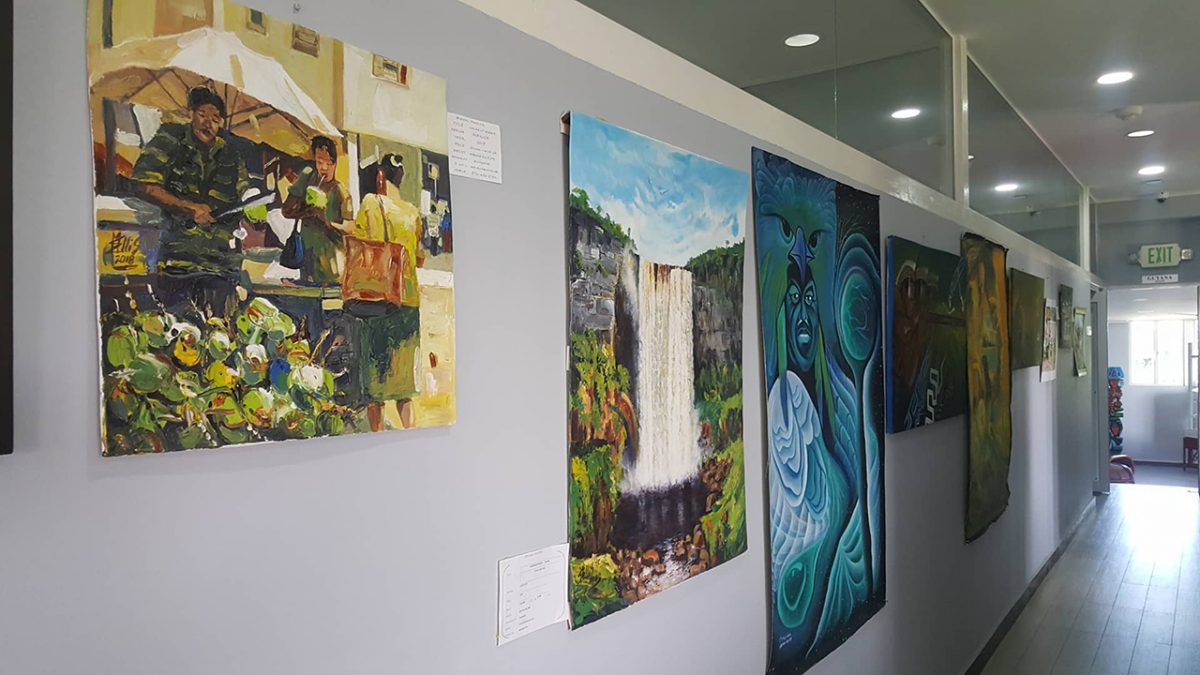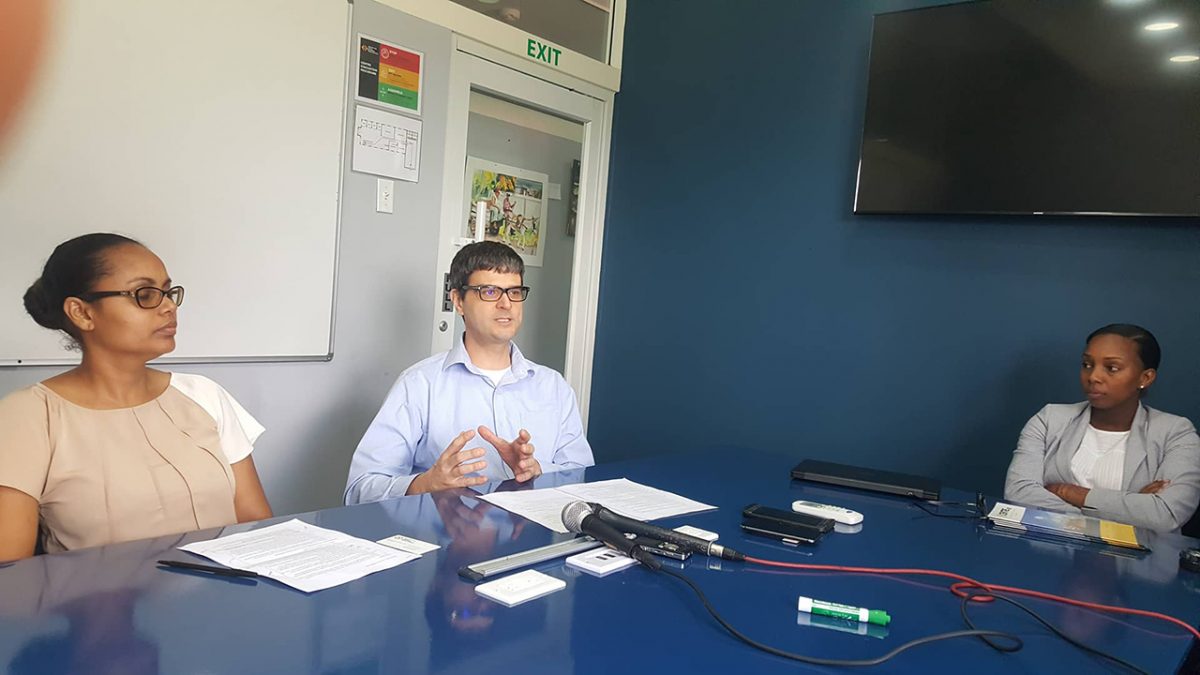With over 2,000 local businesses registered and 70 of those securing joint ventures or other partnerships with international businesses, the Centre for Local Business Development (CLBD) is seeking ways for members to have easier access to finance.
The CLBD is working on strategic plans with the hope that it will be able to, sometime early next year, have a programme for its members that facilitates access to financing from financial institutions, as that has been a complaint of many small businesses.
To date, some 2,000 local and 1,500 international companies are registered with the centre.

“A piece of the puzzle the centre is working on now is access to finance. The centre is engaging Guyanese banks, Guyanese suppliers…We as the centre and [having] DAI Global experience know that [access to finance] could become a hindrance and want to address that problem now,” Director of the CLBD Patrick Henry said on Friday.
“Access to finance, the financial products that might exist in other parts of the world that just might not exist in Guyana. And the oil and gas sector; the ExxonMobil, the prime contractors, the Guyanese banks… [we are looking at] how can some of the products can be in Guyana so they can be utilised and allow Guyanese to allow access to capital,” he added.
Deputy Director of the CLBD, Natasha Gaskin-Peters added that access to financing is an area that most of the small businesses here complain about and while they may have the necessary training and safety requirements, they are still not able to compete for procurement.
“Now we found that there is an issue with access to financing. Local entities are saying we need access to capital to expand our businesses, to bid on projects. We have to close this gap and the centre is working,” she said.
“We look forward to 2020, to seeing the evolution of these changes and companies being really able to access financing so they can really be able to grow their entities and take advantages of the opportunities,” she added.
The CLBD was set up in July 2017 by ExxonMobil’s affiliate Esso Exploration & Production Guyana Ltd, its Stabroek Block co-venturers, and United States-based development company DAI Global, LLC, to assist local businesses to learn about opportunities in the oil and gas sector, strengthen their competitiveness, and prepare them to join the oil and gas supply chain.
Within the last year, it has spent more time and effort beyond its general area of work and focused on trade missions, including one with the Newfoundland and Labrador Oil and Gas Association, where a group of 25 Canadian companies visited Guyana to explore potential partnerships with local companies.
Henry said that training of companies has been a keen focus and businesses are participating as they prepare themselves to meet the demands of the oil and gas sector, not only here but internationally. The centre has urged small local businesses to get registered. He said that in July, a Heath, Safety, Security and Environment (HSSE) programme was launched where executives of companies were trained and the centre will soon roll out an online computer-based training programme.
“Often Guyanese businesses ask us ‘What do we need to do to get into the oil and gas sector and to participate?’ The centre launched in July, a programme where over 175 businesses took a business seminar because safety starts at the top and there were a series of mentorship and follow-ups with the centre staff. It dealt with support for the Heath, Safety, Security and Environment programme. Businesses, please register. I think we have a really phenomenal uptake in a short period of time, and hopefully by the end of the year, we will have a number of companies that would have finalised the programme,” Henry said.
Smart partnership
Marveling at the local content development here since 2015, the CLBD director spoke of the transformation of a country that had no company that could provide offshore oil and gas support services to now having some 600 companies doing so.
“The centre is in a real unique place in Guyana since when we started. When we started, oil and gas was really new and had no company here that could work offshore. Guyanese companies were really trying to figure out what can we do and how can we partner with companies. By late 2017, the centre started getting wind of persons and international companies that wanted to work in Guyana. They were from Trinidad and Tobago, the United States, Canada, and Africa…and they were coming looking for Guyanese partners. That time, Guyanese businesses were grappling with getting prepared and you had these companies coming in that were looking to work with Guyanese companies and set up businesses in Guyana. And that was where we were in 2017,” he recalled.
So the centre was formed and “since its inception has evolved to meet the needs of Guyanese businesses and the oil and gas sector” even as it continuously responds to market trends by broadening its reach and diversifying its services.
Cognisant of the fact that the training courses it offered would have taken the local businesses only so far, Henry said that the CLBD also recognised that smart partnerships were also needed to expand its reach and services, and it began focusing on that area.
“So, as a centre, we intervened. We started to engage businesses to think about smart partnerships. In this regard, we have been working with businesses across all sectors. When we think of a smart partnership, we think only of joint ventures but partnerships don’t only entail joint ventures. They can entail authorised dealership and [Memorandum of Understandings], also partnerships between Guyanese companies. You can partner with another local so they can bid on a project. We have been encouraging local Guyanese businesses to partake in these ventures. When we think of smart partnerships, we have to think of the transfer of skills and knowledge. We have been involved with the Guyanese community to get more technical work in the oil and gas industry,” he said.
“At present, there are some 600 vendors supporting the oil and gas sector. From 2015, when ExxonMobil started, to 2019, where there are now 600 vendors, there has been a really big change of Guyanese companies working in the oil and gas sector. The oil and gas sector [is] growing. It is a massive investment on their part in getting ready to work in this industry. At times, it is often forgotten what is happening in Guyana and how the Guyanese community is responding,” he added.
Global certification
The centre provides the support services needed by companies to prepare them for global certification and most of them invest to get themselves certified. “The main part of that work and investment comes from the Guyanese businesses themselves. They have to upgrade and train their staff and transform their facilities and invest, which has a cost. At times, it might be low cost, say a fire extinguisher and at times, high cost, a new piece of equipment to bring the standard to what they already have,” Henry said.
Meanwhile, proud of the collaboration between the centre and the businesses, Gaskin-Peters boasted of the partnerships formed, saying that the CLBD continues to look for ways to facilitate those numbers growing. “There is over 70 partnerships that have been born, in one form or the other, in Guyana since 2017 when the centre started tracking this. So from 0 to 70. That is a very good shift. One of the key [things] to understand is that in 2017, no Guyanese company was able to work offshore. They didn’t meet the standards to meet offshore work,” she said.
“Since the idea of smart partnerships has been formed, Guyanese companies have made smart partnerships, they have won work with foreign partners and most importantly, Guyana went from having no company to having companies working offshore. To a company that has staff on the [floating production storage and offloading vessel]. It is amazing the transformation that people are talking about. I don’t know that people generally know that Guyanese people are working on all vessels,” she added.
The partnerships range in the categories of services provided from offshore support to hotels, transportation, and provision of meals, among others.
Henry said that seeing Guyanese actively participating and benefiting from oil and gas works has not been highlighted often but the country should hail itself for the works put in by its people over the short period of time, even as he urged that more businesses make use of the resources available.
“What it means that the 600 companies are working in the oil and gas sector? It means they have become more competitive. It means that work that could have went to foreign companies, actually went to Guyanese companies. It continually means an evolution, a redefinition of what is local content. That concept is changing; more companies are getting work, more companies can work, are winning work and more work is flowing back to local companies,” he said.
He noted that in recent discussions with the United Kingdom-headquartered Tullow Oil, the company said that it was looking for local companies to provide it with a number of goods and support services and even went further to point out that it would be not only for operations here, but in Suriname.
“Tullow was looking for Guyanese companies to support their operations here but that company had to also support their operations in Suriname. If you can work in the oil and gas sector in Guyana, you can work in Suriname. So the idea [is] that Guyanese businesses can bid on work to work in the region. Now the same companies, they are now internationally competitive,” he said.






